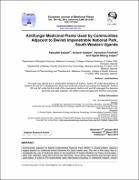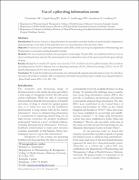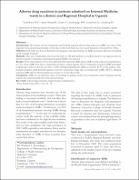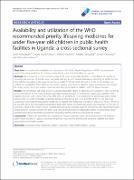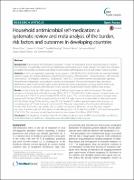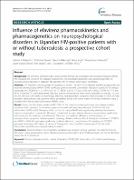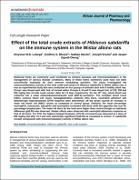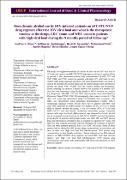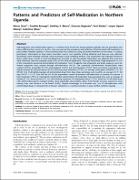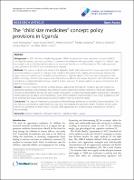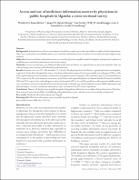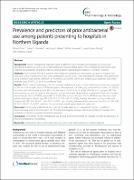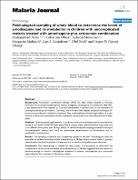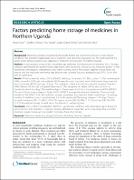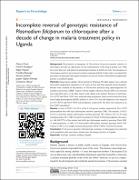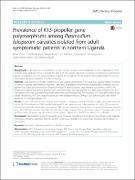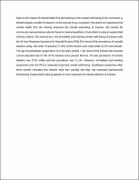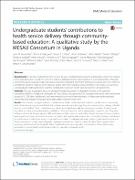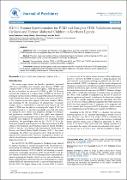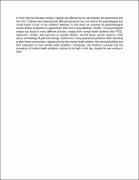Faculty of Medicine: Recent submissions
Now showing items 181-200 of 204
-
Antifungal Medicinal Plants Used by Communities Adjacent to Bwindi Impenetrable National Park, South-Western Uganda
(European Journal of Medicinal Plants, 2015)Communities adjacent to Bwindi Impenetrable National Park (BINP) in South-western Uganda largely depend on traditional herbal treatment for basic health care. The aim of this study was to investigate the use of medicinal ... -
Use of a pilot drug information centre
(African Health Sciences, 2011)Introduction: Provision of access to drug information by prescribers and other health care professionals is important in pharmacotherapy. At the time of this study there was very scanty literature in this area from ... -
Adverse drug reactions in patients admitted on Internal Medicine wards in a district and Regional Hospital in Uganda
(African Health Sciences, 2011)Introduction: The burden of both community and hospital acquired adverse drug reactions (ADRs) are some of the important issues in pharmacotherapy. At the time of this study there was very scanty literature in this area ... -
Availability and utilization of the WHO recommended priority lifesaving medicines for under five-year old children in public health facilities in Uganda: a cross-sectional survey
(Journal of Pharmaceutical Policy and Practice, 2015)Objectives: To explore the availability and utilization of the World Health Organization (WHO) recommended priority life-saving medicines for children under five in public health facilities in Uganda. Methods: We conducted ... -
Household antimicrobial self-medication: a systematic review and meta-analysis of the burden, risk factors and outcomes in developing countries
(BMC Public Health, 2015)Background: Antimicrobial self-medication is common in most low and middle income countries (LMICs). However there has been no systematic review on non-prescription antimicrobial use in these settings. This review thus ... -
Influence of efavirenz pharmacokinetics and pharmacogenetics on neuropsychological disorders in Ugandan HIV-positive patients with or without tuberculosis: a prospective cohort study
(BMC Infectious Diseases, 2013)Background: HIV infection, anti-tuberculosis and efavirenz therapy are associated with neuropsychological effects. We evaluated the influence of rifampicin cotreatment, efavirenz pharmacokinetics and pharmacogenetics ... -
Effect of the total crude extracts of Hibiscus sabdariffa on the immune system in the Wistar albino rats
(African Journal of Pharmacy and Pharmacology, 2013)Medicinal herbs are commonly used worldwide as immune boosters and immunomodulators in the management of various disease conditions. Many of these herbs commonly used have not been scientifically evaluated for their ... -
Does chronic alcohol use by HIV-infected patients on d4T/3TC/NVP drug regimen effect the HIV viral load and what is the therapeutic window of the drugs, CD4+ count and WBC count in patients with high viral load during the 9 months period of follow up?
(International Journal of Basic & Clinical Pharmacology, 2013)The study investigated the effects of chronic alcohol use on HIV viral load in HIV-infected patients on d4T/3TC/NVP drug regimen during 9 months follow up period. It also determined plasma drug concentrations of d4T, 3TC ... -
Patterns and Predictors of Self-Medication in Northern Uganda
(PLOS ONE, 2014)Self-medication with antimicrobial agents is a common form of self-care among patients globally with the prevalence and nature differing from country to country. Here we assessed the prevalence and predictors of antimicrobial ... -
The “child size medicines” concept: policy provisions in Uganda
(Journal of Pharmaceutical Policy and Practice, 2015)Background: In 2007, the World Health Organization (WHO) launched the ‘make medicines child size’ (MMCS) campaign by urging countries to prioritize procurement of medicines with appropriate strengths for children’s age and ... -
Access and use of medicines information sources by physicians in public hospitals in Uganda: a cross-sectional survey
(African Health Sciences, 2008)Background: Rational and cost-effective prescription of medicines requires up-to-date and readily accessible medicines information. There are several studies on availability and access to medicines information sources, ... -
Prevalence and predictors of prior antibacterial use among patients presenting to hospitals in Northern Uganda
(BioMed Central, 2015)Background: Human antibacterial exposure occur in different ways including consumption of animal and agricultural products as well as use of prescribed and non-prescribed agents. We estimated the prevalence and explored ... -
Field-adapted sampling of whole blood to determine the levels of amodiaquine and its metabolite in children with uncomplicated malaria treated with amodiaquine plus artesunate combination
(Malaria Journal, 2009)Background: Artemisinin combination therapy (ACT) has been widely adopted as first-line treatment for uncomplicated falciparum malaria. In Uganda, amodiaquine plus artesunate (AQ+AS), is the alternative first-line regimen ... -
Factors predicting home storage of medicines in Northern Uganda
(BioMed Central, 2014)Background: Medicines are kept in households Worldwide for first aid, treatment of chronic or acute disease conditions. This promotes inappropriate use of medicines and hence the associated risks. The study explored ... -
Incomplete reversal of genotypic resistance of Plasmodium falciparum to chloroquine after a decade of change in malaria treatment policy in Uganda
(Reports in Parasitology, 2016)Background: The potential re-emergence of Plasmodium falciparum parasites sensitive to chloroquine provides an opportunity for the reintroduction of the drug in patient care. With the recent discovery and spread of artemisinin ... -
Prevalence of K13-propeller gene polymorphisms among Plasmodium falciparum parasites isolated from adult symptomatic patients in northern Uganda
(BioMed Central, 2016)Background: In the absence of an effective vaccine, malaria treatment and eradication is still a challenge in most endemic areas globally. This is especially the case with the current reported emergence of resistance to ... -
Impact of Mental Health Training on Mental Well-being of Lay Counselors in Northern Uganda
(Jacobs Journal of Community Medicine, 2018)Data on the impact of mental health first aid training on the mental well-being of lay counselors is limited despite a wealth of research on the training of lay counselors. We tested the hypothesis that mental health first ... -
Undergraduate students’ contributions to health service delivery through communitybased education: A qualitative study by the MESAU Consortium in Uganda
(BMC Medical Education, 2016)Background: It has been realised that there is need to have medical training closer to communities where the majority of the population lives in order to orient the trainees’ attitudes towards future practice in such ... -
ICD-11 Trauma Questionnaires for PTSD and Complex PTSD: Validation among Civilians and Former Abducted Children in Northern Uganda
(Journal of Psychiatry, 2015)Abstract Objectives: ICD-11 is expected to introduce a new diagnosis of C-PTSD, along with a revision of the current PTSD diagnosis. Are the suggested diagnostic tools for PTSD and C-PTSD valid in a developing country? Method: ... -
The Psychological Impact of War and Abduction on Children in Northern Uganda: A Review
(International Journal of Mental Health and Psychiatry, 2015)In more than two decades northern Uganda was affected by the war between the government and the LRA. Children were abducted and affected during the war, but what is the psychological and social impact of war on the children? ...

